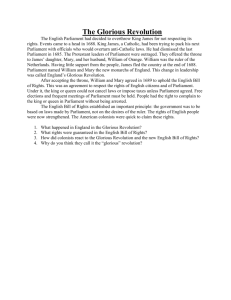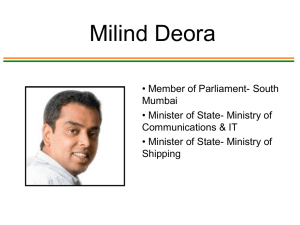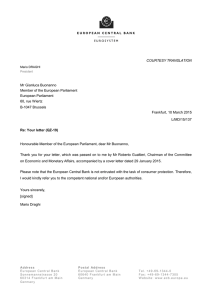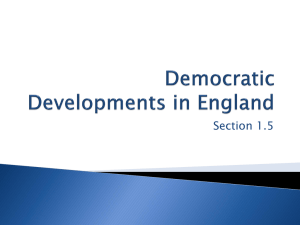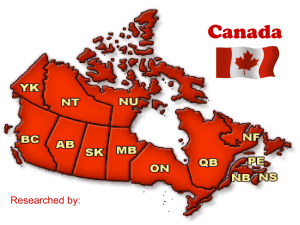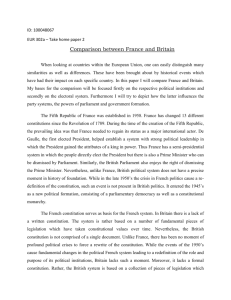Political Contribution on the Reform of the Electoral Law of the
advertisement
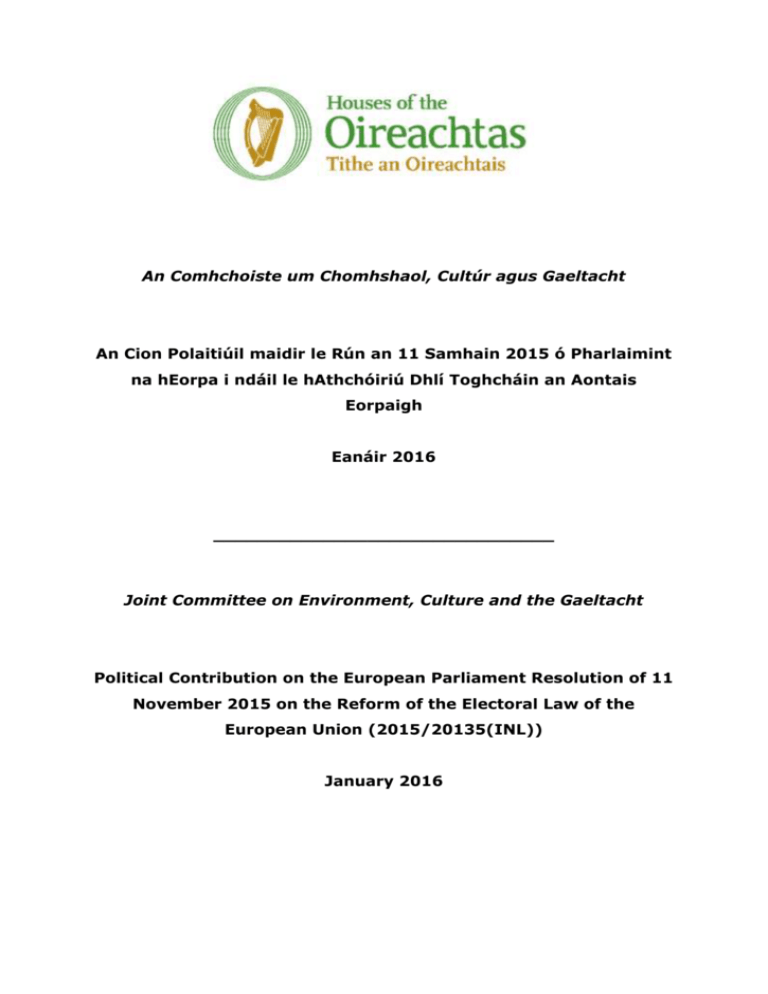
An Comhchoiste um Chomhshaol, Cultúr agus Gaeltacht An Cion Polaitiúil maidir le Rún an 11 Samhain 2015 ó Pharlaimint na hEorpa i ndáil le hAthchóiriú Dhlí Toghcháin an Aontais Eorpaigh Eanáir 2016 _______________________________ Joint Committee on Environment, Culture and the Gaeltacht Political Contribution on the European Parliament Resolution of 11 November 2015 on the Reform of the Electoral Law of the European Union (2015/20135(INL)) January 2016 Political Contribution from the Oireachtas Joint Committee on Environment, Culture and the Gaeltacht on the European Parliament Resolution of 11 November 2015 on the Reform of the Electoral Law of the European Union (2015/20135(INL)), and its “Proposal for a Council decision adopting the provisions amending the Act concerning the election of the members of the European Parliament by direct universal suffrage (2015/0907/APP)” Dublin, 19/01/2016 Introduction The Joint Committee on Environment, Culture and the Gaeltacht (the Committee), having considered the European Parliament’s Resolution of 11 November 2015 on the Reform of the Electoral Law of the European Union, and its “Proposal for a Council decision adopting the provisions amending the Act concerning the election of the members of the European Parliament by direct universal suffrage (2015/0907/APP)”1, has expressed serious concerns and reservations about the nature and content of the proposals contained therein. This contribution was agreed by the Committee on 19 January 2016. Opinion of the Oireachtas Joint Committee on Environment, Culture and the Gaeltacht The Committee is of the opinion that the European Parliament’s Resolution of 11 November 2015 on the Reform of the Electoral Law of the European Union is in breach of the principles of subsidiarity and proportionality, and encroaches upon an area – organisation of elections – which has traditionally been, and should remain, within the scope of national competence. The procedure for European elections is largely governed by national legislation. Whilst EU law establishes some basic common principles, elections to the European Parliament have traditionally been determined by national electoral rules, which differ considerably from one Member 1 Available at: http://www.europarl.europa.eu/sides/getDoc.do?pubRef=-//EP//TEXT+TA+P8-TA2015-0395+0+DOC+XML+V0//EN . State to the next. What is being proposed by the Parliament represents a very significant departure from this and greatly extends the role of the European Union in the organisation of European elections. It is not intended in this Contribution to go through each of the Parliament’s specific proposals in detail. It shall be confined to broad principles underpinning EU law and decision making. Nevertheless, certain measures would be particularly problematic for Ireland in that they would require legislative change and, in some cases, amendment of the Constitution by way of national referenda. The issue of gender equality and quotas, for example, is currently the subject of Constitutional challenge before the Irish courts. The Committee feels very strongly that, in particular, matters such as extending the franchise to citizens resident outside the State, or lowering the voting age, should remain national competences. The Committee acknowledges that the objectives of the Parliament’s Resolution, such as enhancing the effectiveness of the system for conducting European elections and bringing the Parliament closer to voters, are laudable. Likewise, it is recognised that Article 223(1) TFEU gives the European Parliament the right to initiate a reform of European electoral law. Nevertheless, the Parliament is still bound by the principles of subsidiarity and proportionality, which are fundamental to European Union decision making, and which give rise to concerns. The Committee is of the view that the proposals contained within the Parliament’s resolution on electoral law reform are not compliant with the principle of proportionality and exceed what is necessary to achieve its objectives. Under the principle of proportionality, “the content and form of Union action shall not exceed what is necessary to achieve the objectives of the Treaties.”2 It also believes that these proposals are in breach of the principle of subsidiarity, and that EU action is not warranted in this area. The Committee affirms the principle stated within the document Testing European legislation for subsidiarity and proportionality – Dutch list of points for action presented by then-foreign minister Frans Timmermans to the Dutch Parliament, which proposes that action be taken “at a European level only when necessary, at national level whenever possible.”3 In the present case, the Committee believes that electoral law and reform can 2 Article 5(4) TEU. Ministerie van Buitenlandse Zaken, Testing European legislation for subsidiarity and proportionality – Dutch list of points for action. Available at: http://www.government.nl/news/2013/06/21/european-wherenecessary-national-where-possible.html 3 best be addressed at local level, in accordance with local conditions and factors, and there is no necessity for action at European level. The Committee is concerned that the infringement of the principle of proportionality creates problems also in terms of subsidiarity. As a consequence of the proposals being deemed disproportionate, a legitimate question arises as to whether action at EU level is appropriate. It is the conclusion of the Committee that the European Parliament has not demonstrated why action at Union level is required. Conclusion The Committee feels strongly that the European Parliament’s Resolution of 11 November 2015 on the Reform of the Electoral Law of the European Union, whilst motivated by laudable objectives, encroaches unduly upon the area of electoral management, which should properly remain a national competence. In so encroaching, the Resolution is in breach of the fundamental principles of subsidiarity and proportionality which underpin the European Union law-making process. This contribution is without prejudice to the Committee's concerns regarding the mechanism of transmission chosen by the Parliament. The Committee does not consider uploading the document to IPEX to constitute proper transmission to national Parliaments, and it reserves the right to respond further in this regard. ________________________ Michael McCarthy, T.D. Chairman Joint Committee on Environment, Culture and the Gaeltacht 19 January 2016

